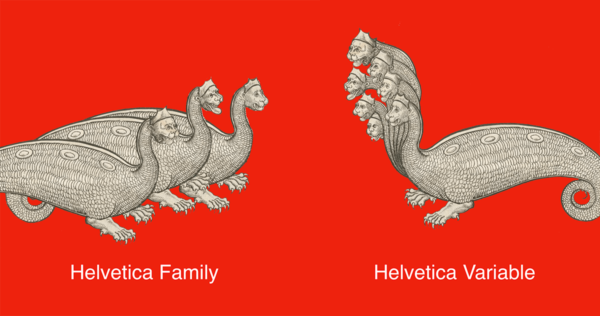The fearsome Hydra provides a handy illustration of current vs. future trends in digital typography.
- Current: typeface “families” with a different cut for each style: e.g. 8 pt/12 pt/ 18 pt, thin/regular/bold, condensed/regular/expanded, etc., and combinations thereof. (“Cut” refers to the metal type of yore, in which the master for each style was literally cut differently out of metal.) Each style is contained in a separate file.
- Different cuts are/were important to customize each version of a typeface to maximize its legibility and readability at any given size/style. (E.g. more space on either side of letters at small sizes so the eye can differentiate between them more easily.)
- Future: typefaces that are designed so that a single master style dynamically (mathematically) alters itself to suit the designer’s need. All styles are contained in a single file, smaller than the many files of the family versions.
Marianna Paszkowska is part of the Font Engineering team at Monotype in Berlin. She specializes in font technology and her current focus is variable fonts. Below is an article introducing the concept and a presentation by Ms. Paszkowska at the 2019 webinale conference in Berlin.
Variable Fonts: the Future Is (Almost) Here!
Ever since the demise of hot metal typesetting and the eventual rise of digital font technology (with a bit of phototypesetting in-between), type designers have been looking for ways to give back to the design community some of the features of metal type that have been taken away – mainly, the ability to customize each size of a typeface to maximize its legibility and readability at any given size. Many methods have been tried – from TrueType GX to Multiple Masters fonts, which didn’t take off, to optical font versions, which have limited availability. But now there is an exciting, new format that promises to provide that long-gone freedom: Variable Fonts.
This still from a presentation by Marianna Paszkowska [see below] illustrates the concept of transition from a typical font family to the new variable version.

Presentation on variable fonts by Marianna Paszkowska at the 2019 webinale conference in Berlin.






